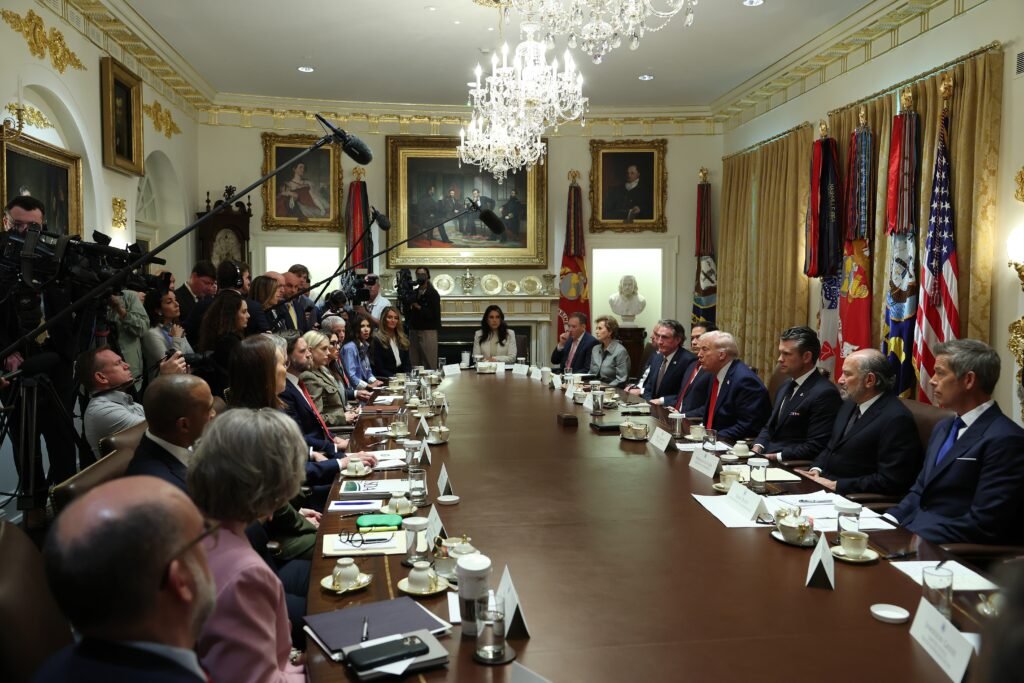Trump Threatens to Cut Democratic Programs Amid Shutdown
WASHINGTON — President Donald Trump indicated on Thursday that he may cancel funding approved by Congress for programs favored by Democrats, though he didn’t provide specifics during a Cabinet meeting.
“We’re cutting back on some of the popular Democratic programs that aren’t favored by Republicans,” he remarked. “They wanted to do this, so we’re giving them a taste of their own medicine.”
As the government shutdown entered its ninth day, U.S. senators failed for the seventh time to pass a temporary spending measure from either party. House Speaker Mike Johnson expressed concern over the intense partisan conflict, saying he was hesitant to reconvene members until a resolution emerged.
“This is going to be personal. Emotions are running high. People are upset. I’m upset,” Johnson stated at a press conference.
Laid Off Workers and Unpaid Wages
Trump has hinted that he plans to unilaterally withdraw federal funding and may even consider laying off thousands of workers. He could also attempt to reinterpret a 2019 law that mandates federal furloughed employees receive back pay after funding resumes.
No details have been shared regarding when these actions might occur, which seems poised to invite further legal challenges. During the Cabinet meeting, Trump suggested that Russ Vought, director of the Office of Management and Budget, would provide further information, but Vought remained silent, and Trump didn’t prompt him for details.
“The government shutdown is doing a lot of damage. I mean, it’s still early. But it’s going to get a little worse as we go along,” Trump said. “We’re going to make permanent cuts, and we’re only going to target Democratic programs. I don’t want to say that, but we’re going to start doing it, and Russell might be able to talk more about it if he wants.”
Presidents are typically required to implement laws passed by Congress, including budgetary allocations. However, the White House Budget Office has previously frozen or canceled funding without legislative approval, violating a law from the 1970s.
This has led to multiple lawsuits, with the Comptroller’s Office alleging that the government is unlawfully withholding funds.
No Voting Progress
On Capitol Hill, lawmakers have been at a standstill for weeks over a stopgap funding bill. The Senate voted 54-45 against a House-passed measure aimed at funding the federal government through November 21. In contrast, the Democrats proposed a counteroffer allowing funding through October 31 while also making substantial changes to health care policy.
The latest voting results did not reflect significant changes from prior efforts. Senators Catherine Cortez Masto of Nevada and John Fetterman of Pennsylvania, alongside independent Angus King of Maine, supported the Republican bill, while Senator Rand Paul of Kentucky opposed it.
According to the rules governing the chamber, at least 60 votes are necessary for the bill to proceed.
This vote followed House Speaker Johnson’s critical remarks about Senate Democratic leader Chuck Schumer, with both sides increasingly blaming each other for the funding deadlock.
“There’s one thing Chuck Schumer cares about more than anything, and that’s his Senate seat,” Johnson said. “He doesn’t know how to navigate life outside of Congress. He’ll do anything to keep that seat.”
When discussing the funding delays and growing discord over health policies, Johnson suggested it might be better to keep members apart until a deal is reached.
“I’m a very patient person, but I’m very upset right now because this is dangerous,” Johnson said. “Perhaps keeping them physically separated is for the best? Yes, frankly, it probably is.”
“I wish it weren’t the case. But we need to calm things down. The best way to do that is to restart government operations.”
Military Personnel Pay Concerns
Johnson reiterated his refusal to call the House back to vote on a bill ensuring timely payment for military personnel during the shutdown.
He maintains that the best way to ensure military pay is for Democrats to unite behind the temporary Republican proposal, which remains stalled in the Senate.
In response to questions about the upcoming pay date for military personnel on October 15, Trump mentioned, “It’s probably going to happen,” asserting, “The military will always be taken into account.”
However, Johnson stated at a news conference that a successful resolution lies solely in passing the Republican stopgap measure.
“We already voted to provide for our troops three weeks ago,” he noted. “If we come back to redundantly vote on something we’ve already done, we won’t achieve anything.”
Schumer, D-N.Y., emphasized that the shutdown would continue until Republicans and Democrats manage to extend tax credits for those purchasing health insurance through the Affordable Care Act Marketplace after the year ends.
He also criticized Johnson for the House’s lack of activity, stating that lawmakers had met in D.C. for only 12 days since July’s end.
“What should people who work multiple jobs or weekends think when House Republicans can’t even be bothered to reopen the government?” Schumer questioned.
Collaboration Among New England Senators
Senate Appropriations Chairwoman Susan Collins, a Republican from Maine, mentioned ongoing discussions with Senator Jeanne Shaheen, a Democrat from New Hampshire, regarding a potential resolution to the stalemate.
“I’ve been in very close contact with Senator Shaheen. He’s been constructive in trying to find a pathway forward,” Collins said.
“The ACA issue is critical for many of us, not just Democrats,” she added. “Although tax subsidies need reforms, they must also be extended by year-end. We need to open up the government now to prevent further damage and ensure military personnel receive their pay.”







